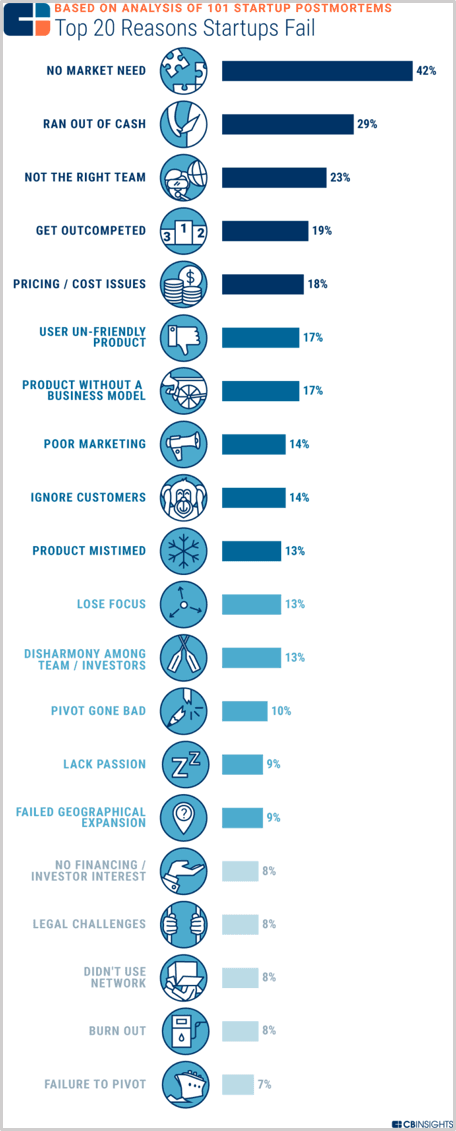
Do You Need MVP or EVP When Starting a Business? Answer These 5 Questions
It's hard to argue that the era of startups has arrived. For example, in 2019, there were 30.7 million small businesses registered in the United States. And while every entrepreneur dreams of turning their businesses into giants like Facebook or Airbnb, they must not only turn an idea into a high-quality product or service but also provide the consumer with a unique value, stay ahead of thousands of competitors, and accurately predict the market conditions. This is a very difficult task.

According to published statistics from Small Business Trends, only two out of five startups are profitable. In addition, the US Small Business Administration reports that only 50% of businesses with employees make it past the five-year milestone. There are many reasons for failure, but CBInsights’ research indicates that no market need is the main one.
Today, the development and availability level of IT puts everyone on an equal footing and allows them to create working products. But, for example, determining the timeliness and need for software or a mobile app in the market is a key and challenging task for an entrepreneur. The concepts of MVP and EVP are intended to help with this. This works not only for young unknown startups but also for new offerings from well-known companies. It remains only to figure out what is right for your business, which our article will help with.
So What Are an EVP and MVP?
Let's start with what is an EVP, as it's a relatively new term compared to the already familiar MVP.
An EVP (Exceptional Viable Product) is an almost final version of an application or other product released to the market after many internal iterations and improvements. An EVP is intended to immediately shake the market, as it is already endowed with full functionality and performance, a nice design, and security. This approach implies complete confidence that the idea and its implementation will work perfectly without preliminary testing in the market. An EVP is tested by in-house developers and a few regular customers until a better version is released.
An MVP (Minimum Viable Product) is a concept. That is, it’s a basic application with minimal functionality that gives an idea of the future product. The MVP is brought to market in its raw form to gather feedback and test the idea for viability. Such early feedback allows the owner to save money and time in order to understand exactly how to develop the product further and whether it is worth doing it at all. A real audience tests the MVP until the startup gets a good product.
The two approaches are diametrically different, but each has its own advantages that are important to understand in the confrontation between MVP versus EVP.
Key Advantages of EVP over MVP
Loud market entry
You are not testing an idea, something small and in its infancy, but presenting to the masses a full-fledged large killer product. This attracts the attention of not only your audience but also relatives, causes a significant wave of interest in the market, and, ideally, allows you to quickly win a niche. This affects your brand, reputation, and, as a result, income.
Clear feedback
Since you are launching a version of the product as close as possible to the final one with all the intended features, you can get clean and accurate feedback without guesswork or misunderstanding of the target audience. The consumer does not need to fantasize about what else this button will be able to do, which means that his impressions will be as specific and realistic as possible.
Minimal post-launch improvements
An EVP already has the perfect version of your product. You no longer need to invest in development, testing, or design.
Breakthrough over competitors
In a highly competitive market, an EVP is the best solution, since you do not show your competitors your developments that are far from final. Thus, you deprive them of the opportunity to get ahead of you, as can happen with an MVP. After all, if a competitor has more development resources, it will shorten the time to market, which can be fatal to your business. An EVP, in this case, is a killer solution for your competitors.
Maintaining a high level of brand reputation
Your product makes an impeccable impression on consumers, which means it reflects on your reputation and audience loyalty.
Sidenote: The most outspoken advocate of the EVP development approach is Apple.
Key Advantages of MVP over EVP
Idea verification
If you are not sure about the concept or do not understand how to completely shape the product, what functionality is important to add, and what exactly to refuse, then an MVP is the best solution. By launching an MVP, you will see how much your product is in demand in the market and whether you can make your offer unique.
Fast time to market and early feedback
By adding limited functionality to the first version, you can quickly go through the first stage of development and get feedback from real consumers. Early reviews will help you avoid unnecessary investments and properly organize development in terms of a team, financial, and time resources. In addition, it is an opportunity to establish yourself in the market. It is important to remember that stretching development over time is only beneficial when there is low competition in the market, when you are sure you have enough time to test each subsequent version and retain your audience.
Saving resources
It makes sense that, with a quick launch and limited functionality, you won't spend a lot of money in advance. For example, most developers are paid hourly, which means a modest investment is enough for a small prototype. Therefore, MVP development is considered a cost-effective approach. By the way, it is interesting that, according to the financial platform Kabbage, a third of small businesses start with a budget of less than $5,000.
Low risk of losing budget
If your idea fails, you won't lose a lot of investment, as you can test your idea for a fairly reasonable price.
Attracting investors
When you gain a foothold in the market and your idea seems interesting, opportunities open up for you to attract third-party investment in your startup.
Sidenote: At one time, these world-famous companies started with MVPs: Yahoo!, Airbnb, Foursquare, Facebook, Zappos, Dropbox, and others.

Key Advantages of EVP over MVP
Loud market entry
You are not testing an idea, something small and in its infancy, but presenting to the masses a full-fledged large killer product. This attracts the attention of not only your audience but also relatives, causes a significant wave of interest in the market, and, ideally, allows you to quickly win a niche. This affects your brand, reputation, and, as a result, income.
Clear feedback
Since you are launching a version of the product as close as possible to the final one with all the intended features, you can get clean and accurate feedback without guesswork or misunderstanding of the target audience. The consumer does not need to fantasize about what else this button will be able to do, which means that his impressions will be as specific and realistic as possible.
Minimal post-launch improvements
An EVP already has the perfect version of your product. You no longer need to invest in development, testing, or design.
Breakthrough over competitors
In a highly competitive market, an EVP is the best solution, since you do not show your competitors your developments that are far from final. Thus, you deprive them of the opportunity to get ahead of you, as can happen with an MVP. After all, if a competitor has more development resources, it will shorten the time to market, which can be fatal to your business. An EVP, in this case, is a killer solution for your competitors.
Maintaining a high level of brand reputation
Your product makes an impeccable impression on consumers, which means it reflects on your reputation and audience loyalty.
Sidenote: The most outspoken advocate of the EVP development approach is Apple.
Key Advantages of MVP over EVP
Idea verification
If you are not sure about the concept or do not understand how to completely shape the product, what functionality is important to add, and what exactly to refuse, then an MVP is the best solution. By launching an MVP, you will see how much your product is in demand in the market and whether you can make your offer unique.
Fast time to market and early feedback
By adding limited functionality to the first version, you can quickly go through the first stage of development and get feedback from real consumers. Early reviews will help you avoid unnecessary investments and properly organize development in terms of a team, financial, and time resources. In addition, it is an opportunity to establish yourself in the market. It is important to remember that stretching development over time is only beneficial when there is low competition in the market, when you are sure you have enough time to test each subsequent version and retain your audience.
Saving resources
It makes sense that, with a quick launch and limited functionality, you won't spend a lot of money in advance. For example, most developers are paid hourly, which means a modest investment is enough for a small prototype. Therefore, MVP development is considered a cost-effective approach. By the way, it is interesting that, according to the financial platform Kabbage, a third of small businesses start with a budget of less than $5,000.
Low risk of losing budget
If your idea fails, you won't lose a lot of investment, as you can test your idea for a fairly reasonable price.
Attracting investors
When you gain a foothold in the market and your idea seems interesting, opportunities open up for you to attract third-party investment in your startup.
Sidenote: At one time, these world-famous companies started with MVPs: Yahoo!, Airbnb, Foursquare, Facebook, Zappos, Dropbox, and others.
Approach Comparison: EVP vs. MVP
To complete the benchmarking analysis, let's group the key differences between MVP versus EVP development according to a few common factors.
| EVP | MVP | |
| Confidence in the idea | 100% confidence in success | Idea validation required |
| Market launch | Long time to market due to the development of the ideal version bordering on the final product | Fast time to market with minimal functionality |
| Version | Perfect, almost-finished product | A prototype of the future product |
| Expenses | High | Low |
| Testing | Inside the company; conducted by your own developers and a limited number of clients | On the market; conducted by real consumers |
5 Questions for a CEO to Choose Between EVP and MVP
Thus, we are approaching the point when the choice in favor of the first or second type becomes clearer. To make it even easier, test yourself and answer the five questions below.
1. Are you sure your idea will break through the market?
If you know for sure that your product is a new Apple, and the first impression of customers should be decisive, start creating an EVP. To test the idea and see if it is worth wasting your time and effort, an MVP is better suited.
2. What is the level of competition in your target market?
If your niche has few or no competitors, you can gradually tweak your solution, test various features, and study user behavior. Your audience will not leave you, as there are no alternatives yet. But in a highly competitive environment, you may simply not have enough time for phased product development, and the first impression should immediately hook consumers and dissuade them from looking for other solutions.
3. Are your resources for development and product launch limited?
An MVP requires much less investment, and if your resources are not close to unlimited, then this option will be closer to you. With complete freedom in budget and time, you can start a long game with an EVP right away, as this approach is definitely not a way to save money.
4. What are your goals at this stage - short-term or long-term?
Testing an idea is a short-term goal on the path to growing your business. If you're chasing it right now, an MVP is the best solution to this need. If you are aiming at conquering the market, and the marketing component plays a key role for you, you need to present the ideal product, which is an EVP.
5. What is the level of your brand awareness in the market?
If your brand is not widely known, it is unlikely that consumers will immediately embrace your product. Therefore, it makes sense to enter the market gradually. But if you're Amazon, your audience is unlikely to understand you if you present them with a rough concept.
Read our article to find out what are the steps to build an mvp.
Our Experience
We at Gearheart have quite a lot of experience with both MVPs and final products. We understand that every product and business is different, so we use individual strategies at every stage of MVP development: from prototyping, launching, and collecting feedback to subsequent modifications. Our successful MVPs include government procurement platforms and LookSMI SaaS for media monitoring and analytics. In addition, customers often prefer our experts to work on the final product using best practices to develop server-side and client-side architecture. You can read more about the completed projects in our portfolio.
Conclusion
We hope that now you clearly understand which approach should be discussed with your development team. As you can see, it all starts with an idea. It is then important to analyze your resources, brand popularity, and market competition. Our team is always happy to help you create a notable product and grow your business. Whether it is an MVP or EVP, we provide the technological side and can analyze the market in order to properly meet its needs.



